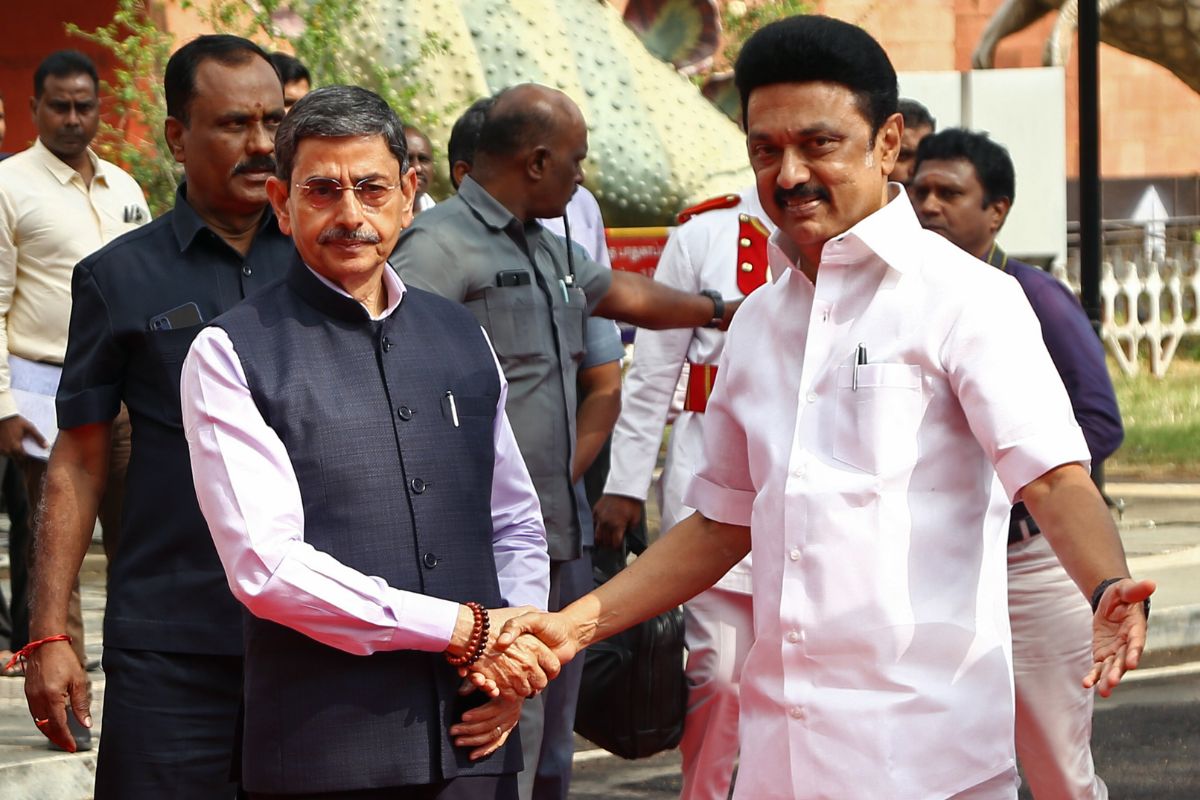SC defers Balwant Singh Rajoana – 1995 killer of Punjab CM Beant Singh – plea for release
Senior advocate Rohatgi, appearing for Rajoana, urged the bench to grant temporary release to Rajoana.
As apprehensions were expressed that the Governor may go ahead with further steps on reference of Bills to the President, Chief justice Chandrachud said: “They know we are here.”

RN Ravi and MK Stalin
Directing the Tamil Nadu Governor RN Ravi to invite State Chief Secretary MK Stalin and resolve the stand-off on the fate of the Bills sent to him for his assent, the Supreme court on Friday said that the Governor Ravi, under Article 200 of the Constitution, has three options to deal with the Bills passed by the State legislature and presented to him for assent and cannot “kill”, “stall” and “stultify” them by keeping them on hold.
“We will appreciate, if the Governor resolves the issue. Let the Governor invite the Chief Minister,” Chief Justice DY Chandrachud heading a bench also comprising Justice J.B. Pardiwala and Justice Manoj Misra said that once the Governor has withheld the Bills sent to him for his assent, then they cannot be reserved and referred for the consideration of the consideration.
The bench posted the matter for hearing on next Friday – December 11, 2023.
Advertisement
As apprehensions were expressed that the Governor may go ahead with further steps on reference of Bills to the President, Chief justice Chandrachud said: “They know we are here.”
The top court in the earlier hearing has stated that if the Governor chooses to withhold the assent, then he extinguishes the option of reserving the Bills and refers them for the consideration of the President.
“Mr. Attorney General, we will like the Governor to resolve the impasse,” Chief Justice Chandrachud told the Attorney General R Venkataramani who appeared for the Central government.
As the Attorney General R. Venkataramani appearing for the Centre said that beyond the three-options available to the Governor under Article 200 – to give assent, withhold assent and send it back to the legislature with message or reserve it for consideration by the President – the Governor can continue withholding the Bill, Chief Justice Chandrachud asked if the “Governor has independent power (beyond the Article 200) to withhold the Bill (passed by the legislature) and kill it.’’
Referring to the Article 200 of the constitution, the bench said that after a Bill has been re-endorsed (repassed) by the legislature, the only course available to him to give his assent.
The strong observations from the bench came when it was told that after the Tamil Nadu assembly had reiterated the bills that were withheld by the Governor Ravi, the latter has now sent them to the President of India for consideration.
The bench in an unequivocal term said that the referring Bills repassed by the State assembly to the President of India was not available to the Governor.
Noting that the President is an elected office and the Governor is a “nominee” of the Central government, the bench said, “There is an ambivalence on the part of the Governor” and when he withheld the assent where is the option of sending it to the President for consideration.
“He (Governor) could have sent to the President (in the first instance), there is an ambivalence on the part of the Governor,” Chief Justice Chandrachud said as Attorney General Venkataramani sought to carve out an option Governor after withholding the assent will keep the Bill to himself without exercising any of the three options under the Article 200 of the constitution.
Describing Governor Ravi’s acts as “constitutional obstinacy,” senior advocate Abhishek Manu Singhvi appearing for the Tamil Nadu government, referred to earlier judgments of the top court where the issue before the court on the powers of the Governor on the Bills sent to him for assent are long settled.
In the last hearing of the matter on November 20, the Supreme Court had said that Governor Ravi acted on the bills that were long pending with him only after it issued notice on the State government plea seeking its intervention, and had stated that that under Article 200 of the constitution Governor has to act “as soon as possible” in exercising three options – give assent, withhold the assent and return the bill for reconsideration or reserve it for consideration by the President.
When the Attorney General Venkataramani in the last hearing had told the bench that the present incumbent Ravi became the Governor on September 18, 2021, suggesting that the bill presented to the Governor in 2020, he was not there, the Chief Justice Chandrachud had said, “We are talking about the office of Governor” … “Issue is not whether any particular Governor delayed but whether in general there has been a delay in exercising the constitutional functions.”
Advertisement